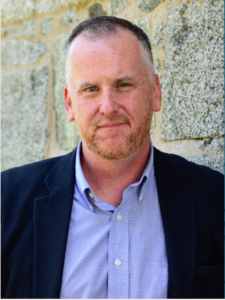By Christa Rodriguez || Campus Life Editor

Michael Patrick Lynch, professor of philosophy and Director of the Humanities Institute at the University of Connecticut, gave this past Thursday’s Common Hour talk, titled “Common Reality and Our Digital Lives.” In addition to lecturing widely, Lynch is also author and editor of several books, as well as a frequent contributor to the New York Times’ “The Stone” weblog. This Common Hour was proposed by Bonnie Powers and Scott Vine and is co-sponsored by Philosophy, Psychology, Religious Studies, American Studies, the Faculty Center and the Miller-Humanities Fund.
At the start of his talk, Lynch had the audience imagine a world in which their phone is directly hooked up to their brain. It would be “as easy and as intimate as thinking,” he said. Even if this were true, it does not mean the information itself is more accurate. In fact, Lynch stated, the more data you take in, the harder it is to evaluate. Even though our phones are not that invasive, we do have a wealth of information right in our pockets. This often makes it difficult to distinguish between what is real and what is fake. Lynch said, “It’s as if we know more, but understand less.”
According to Lynch, we often use technology in a way that isolates our information bubbles. In America today, we are not only polarized over values, said Lynch, but also over the facts. The Internet gives us the information we want because we tailor our internet usage to our preferences, which is how the different platforms are made to work. Lynch noted, “every click, every like, every comment leaves a data trail.”
Our personalized online life makes “what we want reflect what we already think,” Lynch said. He continued by defining the concept of knowledge polarization, which means that we cannot agree on what we know; we can’t agree on the real, objective truth. One solution to this problem is to redesign our platforms, which some are already trying to do. However, this alone is not enough for Lynch because the problem is essentially human. To solve this problem, he suggests turning to people who deal with humans, including political scientists, historians, psychologists, philosophers, and more.
Lynch outlined three ideas of his own for addressing the issue of knowledge polarization: believing in truth, daring to know, and having humility. The first concept, believing in truth, is a response to the philosophical argument that we cannot step out of our own perspective. Saying that there is no objective truth is dangerous to Lynch because it rationalizes biases. Of course, Lynch admits, it is hard to know anything for certain. But we do agree on a lot of things in this world, such as the fact that a bullet can kill you. He acknowledges that it is easier for us to live in our own reality. However, with the term “fake news” has been appropriated, in Lynch’s eyes, to now mean anything one disagrees with. He claimed that we must believe in one truth to reduce knowledge polarization.
Secondly, Lynch introduced the Latin idea from Kant: “sapere aude,” or “dare to know.” By this, he means that people must search for the truth, even if it goes against one’s preconceived biases. Daring to know includes performing longer ways of knowing that aren’t as personalized Lynch noted that there is a difference between downloading a set of facts from Google and understanding those facts. He suggested that people instead try to work through the proof by getting out and actually talking to people.He clarified that he is not saying we should stop “Google – knowing,” but rather we should not overvalue it. The point is, we should be careful about treating Google as the all-knowing “oracle in our pockets.” Daring to know involves risking the possibility that we could be wrong.
Lastly, Lynch spoke about having what he called epistemic humility, which recognizes that we don’t know it all keeps our worldview open to improvement from the evidence and experience of others. This last part includes being willing to expand our knowledge from what other bring to the table. Lynch alluded to certain national figures in the U.S. that are not so good at epistemic humility, though he did not name names. However, epistemic humility is also difficult for people in general because we confuse arrogance with real confidence, Lynch stated.
At the end of his Common Hour talk, Lynch maintained that democracies cannot function without believing in truth and seeking out understanding from a diversity of perspectives.
Junior Christa Rodriguez is the Campus Life Editor. Her email is crodrigu@fandm.edu.